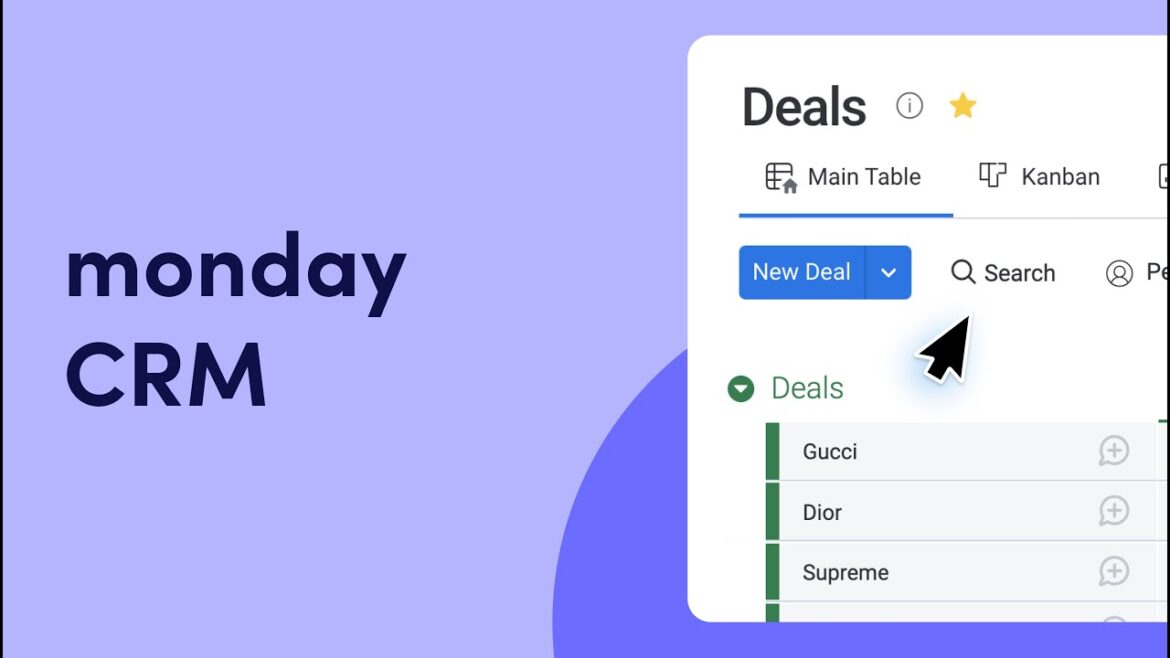CRM Software Monday! In today’s highly competitive business landscape, managing customer relationships efficiently is crucial for success. This is where CRM (Customer Relationship Management) software comes into play. CRM software monday provides businesses with a comprehensive suite of tools and features to streamline customer interactions, enhance collaboration, and improve overall efficiency. In this article, we will explore the benefits, features, and implementation of CRM software, specifically focusing on its integration with Mondaydotcom, a popular project management platform.
1. Introduction
As businesses grow, maintaining strong relationships with customers becomes increasingly challenging. CRM software serves as a centralized hub for managing customer data, interactions, and insights. By leveraging CRM software, businesses can improve customer satisfaction, streamline sales processes, and gain a competitive edge in their industry.
2. What is CRM Software?
CRM software is a technology solution that enables businesses to store, organize, and manage customer data effectively. It provides a 360-degree view of customers, including their contact information, purchase history, communication logs, and preferences. This comprehensive understanding helps businesses tailor their interactions and deliver personalized experiences to customers.
3. Benefits of CRM Software
Implementing CRM software offers several benefits for businesses:
3.1 Improved Customer Relationships
CRM software allows businesses to track customer interactions, identify their needs, and provide timely and relevant support. By maintaining a central database of customer information, businesses can personalize their communication and offer proactive solutions, ultimately leading to stronger customer relationships.
3.2 Streamlined Sales Processes
CRM software streamlines sales processes by automating repetitive tasks such as lead management, pipeline tracking, and quotation generation. This automation enables sales teams to focus on building relationships and closing deals, leading to increased productivity and revenue.
3.3 Enhanced Collaboration
CRM software facilitates collaboration among teams by providing a centralized platform for sharing customer-related information. By having access to real-time customer data and communication logs, different departments can work together seamlessly, aligning their efforts to deliver a cohesive customer experience.
4. Features of CRM Software
Modern CRM software comes with a wide range of features to meet the diverse needs of businesses. Some key features include:
4.1 Contact Management
CRM software allows businesses to store and organize customer contact details, making it easy to manage and update information as needed. This feature ensures that businesses have accurate and up-to-date customer data at their fingertips.
4.2 Sales Pipeline Management
CRM software enables businesses to track the progress of leads through the sales pipeline. Sales teams can easily visualize and manage their sales opportunities, ensuring that no potential deals slip through the cracks.
4.3 Task and Activity Tracking
CRM software provides tools for assigning tasks, setting reminders, and tracking activities related to customer interactions. This feature helps sales and customer service teams stay organized and ensures that important follow-ups are not missed.
5. Choosing the Right CRM Software
When selecting CRM software for your business, consider the following factors:
5.1 Scalability and Customization
Choose CRM software that can scale with your business and be customized to meet your specific requirements. Look for solutions that offer flexibility in adding new features and integrating with other business systems.
5.2 User-Friendliness
A user-friendly CRM software ensures a smooth adoption process and reduces the learning curve for your team. Consider intuitive interfaces, ease of navigation, and comprehensive training and support materials provided by the CRM software vendor.
5.3 Integration Capabilities
Ensure that the CRM software integrates seamlessly with your existing tools and systems. Integration with project management platforms like Mondaydotcom can provide a unified view of customer-related information and improve collaboration across teams.
6. Implementing CRM Software
Implementing CRM software requires careful planning and execution. Follow these steps for a successful implementation:
6.1 Define Objectives and Key Metrics
Clearly define your objectives and identify the key metrics you will use to measure the success of your CRM implementation. This will help you stay focused and ensure alignment with your business goals.
6.2 Cleanse and Import Data
Before migrating to CRM software, clean and validate your existing customer data. Remove duplicates, update outdated information, and ensure data accuracy. Then, import the clean data into the CRM software.
6.3 Configure Customizations
Customize the CRM software to match your business processes and workflows. Configure fields, layouts, and permissions to reflect your specific requirements. This step ensures that the CRM software aligns with your unique business needs.
6.4 Train and Educate Users
Provide comprehensive training and educational resources to your team members to ensure they understand how to use the CRM software effectively. Encourage adoption by highlighting the benefits and demonstrating the impact it can have on their daily tasks.
7. Integrating CRM Software with Monday
Mondaydotcom is a popular project management platform known for its flexibility and collaboration features. Integrating CRM software with Mondaydotcom brings together customer-related information and project management capabilities, creating a holistic view of customer interactions and project progress.
To integrate CRM software with Mondaydotcom, follow these steps:
- Identify the CRM software that offers seamless integration with Mondaydotcom.
- Configure the integration settings, including data synchronization preferences and access permissions.
- Map the relevant CRM data fields to Mondaydotcom boards and columns.
- Set up triggers and automations to ensure real-time data updates between the CRM software and Mondaydotcom.
8. Increasing Efficiency with CRM Software
CRM software significantly increases efficiency in various aspects of business operations. Let’s explore how:
8.1 Streamlining Sales Processes
By automating repetitive tasks and providing a centralized platform for managing leads and deals, CRM software empowers sales teams to work more efficiently. Sales reps can focus on high-value activities such as building relationships and closing deals, ultimately driving revenue growth.
8.2 Enhancing Customer Service
CRM software enables businesses to deliver exceptional customer service by providing a unified view of customer interactions. Service agents can access customer history, preferences, and communication logs, enabling them to resolve issues promptly and deliver personalized support.
8.3 Improving Collaboration
CRM software facilitates collaboration among different departments, breaking down silos and promoting cross-functional teamwork. Real-time access to customer data and communication logs ensures that everyone is on the same page, leading to better coordination and improved customer experiences.
9. Streamlining Sales Processes
By automating repetitive tasks and providing a centralized platform for managing leads and deals, CRM software empowers sales teams to work more efficiently. Sales reps can focus on high-value activities such as building relationships and closing deals, ultimately driving revenue growth.
10. Enhancing Customer Service
CRM software enables businesses to deliver exceptional customer service by providing a unified view of customer interactions. Service agents can access customer history, preferences, and communication logs, enabling them to resolve issues promptly and deliver personalized support.
11. Improving Collaboration
CRM software facilitates collaboration among different departments, breaking down silos and promoting cross-functional teamwork. Real-time access to customer data and communication logs ensures that everyone is on the same page, leading to better coordination and improved customer experiences.
12. Analyzing Data and Generating Reports
CRM software provides robust reporting and analytics capabilities, allowing businesses to gain valuable insights from their customer data. By analyzing trends, identifying patterns, and tracking key performance indicators, businesses can make informed decisions and optimize their strategies.
13. Mobile Accessibility and CRM Software
With the increasing prevalence of remote work and the use of mobile devices, CRM software offers mobile accessibility. This means that sales reps and customer service agents can access critical customer information, update records, and manage tasks on the go, improving productivity and responsiveness.
14. Security and Privacy Considerations
When implementing CRM software, it is essential to prioritize security and privacy. Choose a reputable CRM software provider that adheres to industry-standard security protocols. Implement user access controls, data encryption, and regular data backups to safeguard sensitive customer information.
15. Conclusion
CRM software is a powerful tool for businesses to manage customer relationships effectively, streamline sales processes, and enhance collaboration. By integrating CRM software with platforms like Mondaydotcom, businesses can achieve greater efficiency and provide exceptional customer experiences. With its comprehensive features and benefits, CRM software Monday becomes a valuable asset for businesses of all sizes.
FAQs
- What is CRM software? CRM software is a technology solution that helps businesses store, organize, and manage customer data effectively. It provides tools and features to streamline customer interactions, enhance collaboration, and improve overall efficiency.
- How does CRM software benefit businesses? CRM software offers several benefits, including improved customer relationships, streamlined sales processes, enhanced collaboration, data analysis, and mobile accessibility. It helps businesses deliver personalized experiences, increase productivity, and drive revenue growth.
- What should businesses consider when choosing CRM software? Businesses should consider scalability, customization options, user-friendliness, and integration capabilities when selecting CRM software. It is important to choose a solution that aligns with their specific needs and integrates seamlessly with existing tools.
- How can CRM software improve collaboration? CRM software promotes collaboration by providing a centralized platform for sharing customer-related information. It enables different departments to work together, align efforts, and deliver a cohesive customer experience.
- Is CRM software secure and private? Reputable CRM software providers prioritize security and privacy. They implement industry-standard protocols such as user access controls, data encryption, and regular backups to protect sensitive customer information.




